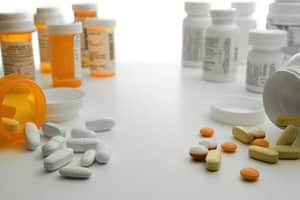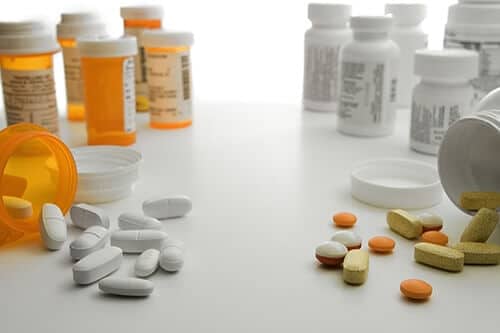When learning about substance abuse and addiction, the topic of prescription painkillers often comes up. In fact, these medications are in high demand today, leading to a risk of addiction for many. The following material will discuss the difference between an opioid vs an opiate. Moreover, it will also talk about common side effects that can stem from the abuse of these drugs.
What is the Difference Between an Opioid and an Opiate?
Although many people get confused and believe that opiates and opioids are the same, there are actually many differences between the two. The main difference between an opiate and an opioid is that opiates are naturally made and opioids are synthetically and naturally made. All opiates are classified under the opioids category, but not all opioids are opiates.

Opiates come from the flowering opium poppy. Some opiates can include opium, morphine, codeine, and heroin. O
piates provide extensive pain relief to those who use them, but they also come with a serious potential for addiction.
Opioid is a more general term for the type of drug being used. They also used to treat severe pain like opiates are, and pharmacies carry them under various brand names. Some examples of opioids are oxycodone, hydrocodone, and fentanyl. These substances are highly addictive, so they are usually very carefully watched when prescribed.
Common Side Effects of Opioids and Opiates
Opiates and opioids can create many different side effects in the body. Furthermore, these effects can become very serious. For example, recognize common effects of these types of medications in the list below:
Excessive Drowsiness
Opioids depress the normal functioning of the body. As a result, they can cause the user to become extremely drowsy. If high dosages of these drugs are taken at once, a person may even become impossible to awaken.
Extreme Lethargy
Lethargy is an extreme form of fatigue. In addition, a person who is abusing opioids may not have the energy to perform the most basic daily tasks.
Depression of the Respiratory System
The lungs can also face negative effects due to opioid abuse. As a result, a person abusing opioids may struggle to breathe properly. This slowing down of the normal breathing patterns can result in life-threatening situations.
Slowing of the Heart Rate
The heart also slows down in response to the effects of opioid drugs. However, if the heart rate slows too much, the situation can prove to be life-threatening.
Nausea and Vomiting
Many people who abuse opioid drugs complain about severe gastrointestinal distress. These complaints can include nausea, vomiting, constipation, and crippling stomach cramps.
Paranoia or Anxiety
Emotional changes can also occur as a result of opioid abuse. Those abusing these drugs may become anxious or extremely paranoid about everything around them.
How an Opiate Addiction Develops
A doctor may prescribe an opiate for pain relief. As it interacts with the nervous system’s opioid receptors, the opiate lessens the pain impulses someone feels. When an individual uses a specific amount, he or she may experience feelings of relaxation. The person may even experience some level of euphoria.
As an individual develops a dependency on the opiate, they begin to feel less of the effects at the dosage they were prescribed to take. This can cause someone to often times increase the dosage or even mix other opiates together to feel more of the euphoric high that they first experienced. As a result, an opiate addiction is in the beginning stages of development.
Painkillers make you feel good and forget about the struggles of everyday life, so it’s no wonder why so many people fall victim to opiate addiction. When used so frequently, the repetition of this sensation over and over becomes addicting in itself. Before long, the codeine or morphine someone was prescribed becomes something they can’t live without.
Who Is More Likely to Abuse Opioids?
Both genders abuse opioids. However, men tend to abuse them slightly more often than women. People who have a history of addiction that runs in their families are also more likely to abuse opioids.
In terms of age, young adults and adults are the biggest abusers. Young adults in high school and college use the drug for recreational use. Many teens first test the drug at parties and develop an interest for it.
Adults usually abuse opioids for one of two reasons. First, some adults abuse opioids because they started using them during adolescence. Others develop an addiction after their doctors prescribe the drug for a medical issue.
Available Treatments for an Opiate Addiction
You may have started using opiates for pain management, or maybe you tried them because a friend turned you on to them. Now, you can’t stop. In fact, every time you try, you go right back to them.
You’re powerless against the cravings; however, there is help available. Substance abuse programs at high-quality rehab facilities specialize in helping people overcome their opiate addictions. When you first speak to an intake specialist, they’ll put together a treatment protocol for you. Customization is the key to success, and it addresses your reasons for using.
The first step of recovering from an opiate addiction will be detoxification of the substance that a person is abusing. After detox, our specialists can design a specific treatment plan. Treatment for opiate abuse can include many different facets. Personal counseling, group therapy, and behavioral therapy techniques can all come together to create an effective treatment plan.
Detox
Once an individual who is suffering from addiction enrolls in a rehab program, the first step to recovery will be detoxification. Detoxification is the medical process of slowly weaning an addicted individual off of the substance they have been abusing. Over time, this process eliminates the drugs or alcohol from the patient’s body.
During this process, the patient will experience physical and mental symptoms called “withdrawal symptoms.” The symptoms can be very painful and include things like increased heart rates, profusely sweating and even seizures in some cases. Once this process is over, the patient will can transfer to a rehab facility. The individual can then begin treatment for their addiction disorder.
Here at CRVC, we never recommend individuals to try to detox by themselves at home. We partner with a detoxification facility that will offer the length of stay the individual needs. Also, the facility will oversee each stage of the process to ensure detoxification completion.
Inpatient and Outpatient Facilities
Residential inpatient treatment is the level of treatment that people typically associate with the word “rehab.” This type of care is best for anyone with a more severe addiction problem. Patients will spend long lengths of time in a treatment facility. Medical professionals monitor them around the clock to ensure their safety, as well.
Outpatient rehab is a great alternative to inpatient for individuals who want to maintain their daily routine or have to hold a job to support their family or want to stay in school so they can achieve their degree. It is also a great way to continue therapy once inpatient treatment is over. Outpatient treatment is much less costly than that of inpatient intensive treatment because it does not require the patient to live on the premises of where the rehabilitation is taking place.
Family Counseling Programs
in these programs, family members are brought in to help both the patient and relative understand a better way to cope with recovery. Both parties are able to share thoughts and feelings on the subject, and the program helps to bond one another closer together. This shows the recovering addict they have a long-lasting support system after rehab completion.
Individual Therapy
This therapy allows the patient to talk solely with their therapist about things they may not feel comfortable sharing among others. This oftentimes helps patients to process the emotional side of past situations that ultimately may have helped lead them to their addiction.
Group Therapy
This is another term for a group meeting setting. Primarily verbal to allow patients to interact with one another and share stories of their recoveries and experiences while using. This gives the patient support from people going through similar situations.
Dual-Diagnosis Therapy: Oftentimes, patients are diagnosed with multiple disorders at the same time. For example, a person may have an anxiety disorder while also having a substance disorder. This therapy treats both disorders at the same time, which is definitely beneficial to our patients. We also offer recreational therapies, meditation techniques, acupuncture and holistic treatments that focus on relieving the mind and body of unwanted stress that may have caused the addiction in the first place.
Reality Therapy
Reality therapy is quickly catching on as the gold standard for preparing people for independent living after they finish their rehab program. This treatment model advocates leaving the rehab center under the supervision of a therapist and performing everyday tasks and socializing. You and fellow recovering addicts will be able to visit places like local movie theaters, grocery stores and events for controlled interactions.
You will live with roommates and are in charge of maintaining a household, which will enable you to gain valuable life skills that you’ll need when graduating from the program. Therapists are there to help around the clock if you require their assistance.
You’re not on your own, and you gain perspective that comes from real-world interactions. As a result, you deal with triggers and stressors before they become relapse opportunities. Of course, before you can participate in this level of opiate recovery, you need to talk with your therapists. This will allow you to see if they believe this type of treatment is right for you.
Seeking Professional Help for an Opiate Addiction in Asheville, NC
Getting professional help for an addiction can be a frightening process for some people. Although you may be experiencing many different emotions, it’s important to take the first step toward getting the help you need. In fact, many substance abuse programs exist that can offer great benefits. You may prefer to select a rehab center that promotes family involvement, holistic care, and careful follow-up. For example, our modalities include:
Crest View Recovery Center is an addiction rehab facility in Asheville, North Carolina. CVRC provides innovative techniques and programs that are versatile enough to meet each person’s needs. Crest View also allows for a peaceful experience that enhances the healing process.
Don’t remain locked in a cycle of addiction. The proper rehab facility can help you overcome these issues. Call Crest View Recovery Center at 866-327-2505 to learn how our compassionate treatment team can help you.


